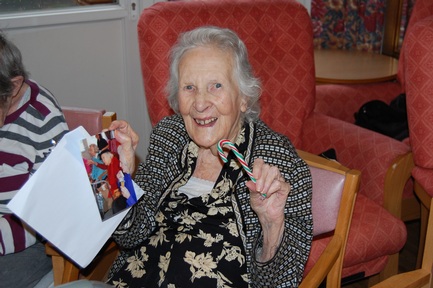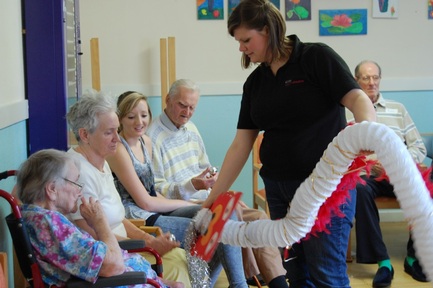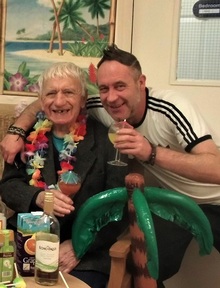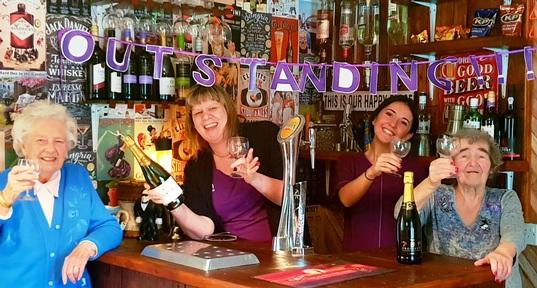People with dementia 'have a future and need to live in the now' not just reminisce about the past
Reminiscence is the latest buzzword when it comes to dementia and a growing number of care homes now offer reminiscence therapy with activities based around things people feel passionate about such as football or music from the past.

However one activity provider, which holds performance activities for people with dementia involving song, movement, music, story making and puppetry, is bucking this trend and insists we have to celebrate the present, rather than base everything on reminiscence.
Katy Hirst, director of Bright Shadow, describes her feeling of despair when someone she met at a conference said to her: “But isn’t the past and their memories all they have left?”
“What this person’s statement illustrated was a lack of value and worth placed on a person with dementia’s present and an even bigger lack of value placed upon their future. If someone thought that my present experience of the world, or my future in it was unimportant then it would certainly make me feel unimportant too. It would make me feel as if I didn’t matter.”
Value who a person is in the present
Bright Shadow, which offers themed, participatory and sensory activity sessions for people with dementia as well as resource kits with materials and guidance for care workers wishing to run their own activity sessions, believes in working in a way that values who a person is in the present moment, doing things that they enjoy and are able to do now.
“We want to ensure that people with dementia have opportunity to have fun, to experience new things, to express themselves, to build relationships and to be creative. We want them to thrive. Thriving implies growth and it implies a future,” says Ms Hirst.
She acknowledges that the past is of course important as it shapes people and makes them who they are.
Valuing our present and future says we matter
However she adds: “Our present is our immediate experience of the world and we all want this to be an enjoyable one. Our future is for our dreams, our passion for life, our hopes and affirmation of our experiences today. For others to value our present and future as well as our past says that we matter.”
Ms Hirst, a trained performance and theatre practitioner, does emphasise that she is not saying that reminiscence therapies, interventions, products and activities do not have a place or a value within dementia care.
Reminiscence is 'only one part of the jigsaw'
“They very much do, and when delivered by trained people in the right context, reminiscence can bring a lot of joy to a person with dementia. When reminiscence organically occurs in our workshops we very much encourage it. However what we are saying is that reminiscence is only one piece of the jigsaw.
“When you meet up with friends in a pub, you may well enjoy a trip down memory lane, but you probably won’t spend all your time there. You will also want to talk about what’s happening now, your future plans, your views on Donald Trump, what you think about the new season of Game of Thrones, or make each other laugh with funny anecdotes. It therefore stands to reason that for a person with dementia, reminiscence is only one part of the jigsaw. So when we plan activities, conduct conversations and reflect on our mindset let’s remember to value the present and future as much as the past.”

Founders Katy Hirst and Rhiannon Lane met while studying Drama and Theatre Studies at Kent University. They set up Bright Shadow seven years ago after doing a placement together at a care home for people with dementia.
“Observing that the most common activity in the care home was sitting silently around the outside edges of a large living room whilst day-time TV blared out, it became apparent that what was needed was an injection of life, laughter, conversation and fun. After a fruitless foray into the world of reminiscence, we realized that using performance practices in a participatory, person-centered way was a relatively undocumented and un-researched approach.”
Transforming people's lives
After two months of running workshops, they found the group of women they were working with were transformed from a passive group of people to a collection of individuals who laughed, communicated, recited poetry, made jokes, had relationships with one another and had great imaginations.
The pair decided that this should not be an “out of the ordinary” experience for people with dementia, but “rather as ordinary and as accessible a way of life as it is for any human being”.
From this came the vision for using creativity and performance to enable people with dementia to have fun, have meaningful relationships with other people, to laugh, to express themselves and to thrive.
Ultimately Bright Shadow is all about “enabling people with dementia to have a present and a future that is worth valuing and is as important as anyone else’s”.
For more information about Bright Shadow go to http://brightshadow.org.uk
Latest Innovative Care News
 13-May-19
'Pink drink' brain cancer treatment rolled out across NHS in memory of Baroness Jowell
13-May-19
'Pink drink' brain cancer treatment rolled out across NHS in memory of Baroness Jowell
 25-Apr-19
Louis Tomlinson helps 83-year-old who lost wife to dementia complete bucket list
25-Apr-19
Louis Tomlinson helps 83-year-old who lost wife to dementia complete bucket list
 22-Mar-19
UK's top care home handyman takes residents to pub for pie and pint
22-Mar-19
UK's top care home handyman takes residents to pub for pie and pint
 12-Feb-19
Michael McIntyre's jokes tested to see if they stop elderly catching flu
12-Feb-19
Michael McIntyre's jokes tested to see if they stop elderly catching flu
 07-Jan-19
'We were lucky to find it': Family's delight as care home is rated Outstanding
07-Jan-19
'We were lucky to find it': Family's delight as care home is rated Outstanding